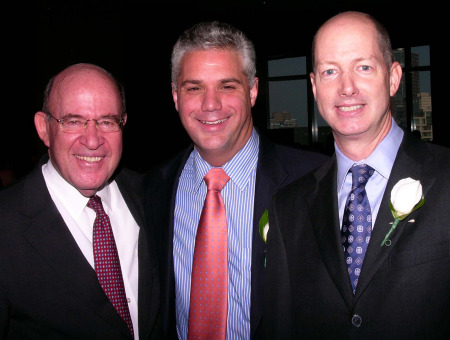
Robert Abrams, Eric Dinallo and Kenneth Harkins | ISRAEL BONDS
Professor Teaches Difference
Between Optimist, Pessimist Text and Photo by Tim Boxer  ALPH NURNBERGER is my kind of guy. The international relations professor of Georgetown University began his analysis of the Israeli-Palestinian conflict with a little whimsy. ALPH NURNBERGER is my kind of guy. The international relations professor of Georgetown University began his analysis of the Israeli-Palestinian conflict with a little whimsy.
The story goes that an incoming pilot asked the control tower for the local time. The answer depends on the airline. If you are Delta, it is 9:15. If you are Continental, the big hand is on the 9, the little hand is on the 3. If you are JetBlue, it is Wednesday. After the 300 guests at the Israel Bonds insurance division luncheon at the Mandarin Oriental New York stopped chuckling, Nurnberger set his sights on the Middle East. "Since President George W. Bush couldnít do it right in Iraq, he has decided that he will solve a 3,000-year-old conflict with a conference on Nov. 26 in Annapolis. That would be his foreign policy legacy." Nurnberger was not optimistic about this Israeli-Palestinian summit. He said itís shortsighted to believe there are two groups of Palestiniansóthat Fatah are the good guys who want to live in peace with a Jewish state and Hamas are the bad guys who want to replace Israel with an Islamic state. "Itís not that simple," he said. "Fatah does not wish us well. Their schools teach hatred of Jews and their maps do not show Israel." Donít get him wrong. The professor still calls himself an optimist. Of course, he defines a pessimist as a person who believes things are so bad they canít get worse. An optimist is a person who says yes they can. Former New York State Attorney General Robert Abrams and Donald D. Gabay, both of Strook Strook & Lavan law firm, presented awards to Eric C. Dinallo, New York State Superintendent of Insurance, and Kenneth V. Harkins, senior vice president and general counsel of American International Group (AIG). Harkins told about a conference call he once had with clients in Israel. Not being Jewish, he didnít understand the language. People kept saying "ken" and Harkins responded with an opinion on the points being made. Only later did a colleague explain that they werenít calling on him; they were saying "yes" in Hebrew. "The moral of the story," Harkins said, "is that if you want to build compromise and bring different sides together, itís better to be named Ken than Low." |